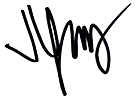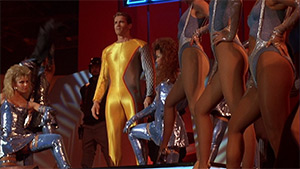It's not as embarrassing as you might think to have been fired a week into shooting The Running Man and replaced by Detective David Starsky from Starsky & Hutch.
Despite his camp origins, Paul Michael Glaser brought just as much experience to the director's chair as you did: in the preceding few years, he'd been behind some of the most seminal episodes of Miami Vice, as well as the Michael Mann-produced television pilot Band of the Hand, which, after it wasn't picked up by the network, was released into theaters. But there's no question that The Running Man would have been a much different film had you stayed on board. Even Arnold Schwarzennegger thought so; he lamented in his autobiography that Glaser "lost all the deeper themes" of the film.
Many of these "deeper themes" orbit the core idea of exploitation as entertainment. That The Running Man preceded the Golden Age of Reality Television by a decade makes it feel, even today, rather portentous--if not prophetic. The Stephen King novella upon which the film is based is focused on different dystopian ideas: urban decay, totalitarian rule. But what the filmmakers chose to focus on instead is what makes the film a rather unique artifact of mid-1980s action excess--and perhaps proves why, despite what many (myself among them) might consider your superior craftsmanship and aesthetic instinct, you probably weren't the right man for the job.
See, The Running Man is a all about television, and that it was written and directed by two of some of the biggest names in television (Glaser, writer Steven E. de Souza) lends it credibility as a satire that seems, as a studio action flick, beyond its mandate. Sure, the action scenes are lazily choreographed, monotonously shot, and laconically edited. Sure, the pacing is rote, waxing and waning to the arrhythmic beats of an hour-long network drama. Sure, some of the cinematic mistranslation is laughable, like the "security camera" footage of the Bakersfield Massacre which is shot-for-shot and edit-for-edit the opening scene of the movie. Yet there's a strange sort of authenticity to the film; the scenes that work best are those that take place in the production offices and control rooms of the nefarious ICS Network, as The Running Man's smarmy presenter, played by real-life game show host Richard Dawson, conspires with the Attorney General and berates his underlings (Dawson, it is well worth noting, gives the film's best performance; his comedic timing is a reminder that long before he was hosting the Family Feud he was famous playing a charming conman/cardsharp on Hogan's Heroes).
Schwarzenegger later complained that Glaser shot the film like a TV show. But the fundamental absurdity of grown men in bright-yellow neoprene suits grappling with low-rent super-villains like Dynamo (if you'll recall, he's the cyborg opera singer who shoots lightning from his fingertips) seems best expressed in the flat, colorful style that Glaser employs. To be frank, the very premise of the movie seems at odds with the procedural style that you would go on to apply to such great effect in your later work.
But it all worked out, didn't it? You may have failed at making a film about the farce and debauchery of network television, but managed, just six years later, to make one of the best television-to-film adaptations in the history of cinema. One could trace the cause-and-effect of being fired from The Running Man to directing The Fugitive (Harrison Ford reportedly saw Under Siege and demanded that producers offer you the job, and Under Siege was the apogee of your collaboration with Steven Seagal, which began with Above The Law--the film you made instead of The Running Man). But the machinations of the Hollywood system are, I think, a bit more complex than that. Glaser's version of The Running Man remains, deservedly, a minor piece in the Schwarzenegger oeuvre, overshadowed by more proficient vehicles for his particular brand of monosyllabic gladitorialism. Like Terminator, like Predator, like_ Total Recall._
All three of those films were made by directors with real cinematic vision. Which begs the question: where would The Running Man rank among all these cult classics if it had been an Andrew Davis film?
Impossible to say. But I prefer you on the wintry streets of Chicago. Let Glaser have his paper-thin hockey-rink sets and perfectly plain primetime sensibility.
Sincerely,

Jared






